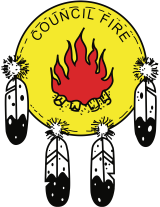Table of Contents
Education, Awareness and Well-being
The Education, Awareness and Well-being Sector organizes and delivers cultural-, literacy-, and employment-based programming geared primarily towards Adult Learners. The Education Sector is responsible for delivering three different programs at Toronto Council Fire – the On^yota’a:ka (Oneida) Language Revitalization Project, the Literacy and Basic Skills (LBS) Program, and the Apatisiwin Employment and Training Program.
Programs
Oneida Language Revitalization Project
Shekoli (Greetings in the language.) The On^yota’a: ka Language Revitalization Project was initiated in the fall of 2022. The English word for On^yota’a:ka is Oneida. The language is part of a family of languages of the Haudenosaunee and is similar in structure to the languages of the Mohawk, Onondaga, Cayuga, Seneca, and Tuscarora. The project focuses on beginner language classes for Oneida people who do not speak the language or have limited knowledge of it.
Learners range in age from age 6 to early 80s. Many of the learners are related to other learners, which enhances the learning process and allows for practice within their family unit. Participants are from many geographical areas including Toronto, Oshawa, Brampton, Mississauga, Barrie, Windsor, New York State, Vancouver, and Oneida of the Thames First Nation.
Classes have focused on greetings, introductions, family, food words, numbers, and animals. The language and traditional Indigenous teachings are intertwined. Classes always begin with the Haudenosaunee Thanksgiving Address. Additionally, the instructor who is also a Faith Keeper for the Oneida of the Thames Longhouse, regularly shares information about traditional ceremonies. Culture is expressed while learning the language.
There is a sacredness in the Oneida language. The meanings are deeper than can be directly expressed in the English language.
“Speaking our language with our families is a gift we give to each other.”
Who Can Participate
Oneida and other Indigenous people living in North America. Oneida members can also invite their family members who are not Indigenous as we wish to support families learning together. This project is for all ages.
Recommended resources
www.uwgb.edu/dictionary/EnglishToOneida.aspx
Note: Classes are virtual.
Funded by OFIFC
Example words
Literacy and Basic Skills Program
The goal of the Literacy and Basic Skills (LBS) Program is to prepare participants to achieve secondary school credits, attend post-secondary school programs, train in pre-apprenticeship programs, and undertake employment preparation.
The program offers individualized tutoring sessions, and group classes, in communication, mathematics, basic digital technology (smartphones, tablets, and personal computers), and art and wellness expression.
The Sector encourages learners to expand their cognitive and cultural capacity as individuals and members of groups living in communities – mainstream and Indigenous alike. LBS Learners are regular participants in outings and events such as the annual City of Toronto Newcomer Day, Native Earth Theatre presentations, movies that embrace Indigenous themes, the recent Ontario Science Summer Solstice Indigenous Celebration Day, and other Toronto Council Fire sponsored and co-sponsored events.
Funded by the Ministry of Labour Immigration Training and Skills Development
Apatisiwin Employment and Training Program
The Apatisiwin Program is sponsored by the Ontario Federation of Indigenous Centres (OFIFC). Apatisiwin is about “employment, training, and jobs”. The goal of the Apatisiwin program is to increase the employment opportunities available to Indigenous individuals, in Ontario. “The program provides a means for participants to gain education, experience, and skills relevant to achieving and maintaining meaningful employment.”
“The Apatisiwin program is intended to assist direct-service users with their employment and training goals such as: securing employment or self-employment, returning to school, staying in school, becoming ready to enter the labour force, and improving their overall employability. Apatisiwin Employment and Youth Employment Counsellors work with community members to conduct trauma-informed and strength-based assessments to help determine and administer appropriate interventions, monitor outcomes, and conduct follow-ups. Apatisiwin also offers employment-related workshops, presentations, establishes partnerships with local employers, and supports job development and community-based projects (based on local community needs and labour market trends).”
“Apatisiwin provides enhanced support for “in-school-youth” which includes early interventions (for those in grades K-12). Apatisiwin program and services are offered through culturally relevant approaches.”
Funded by OFIFC



